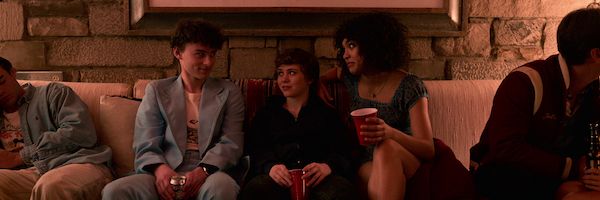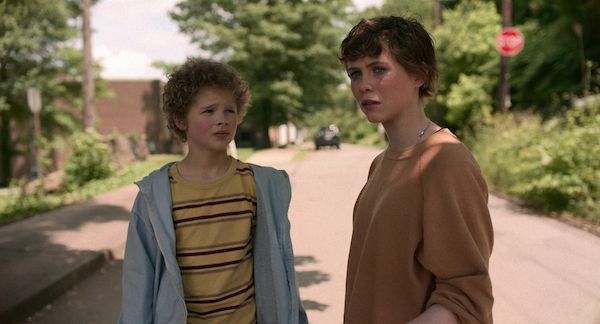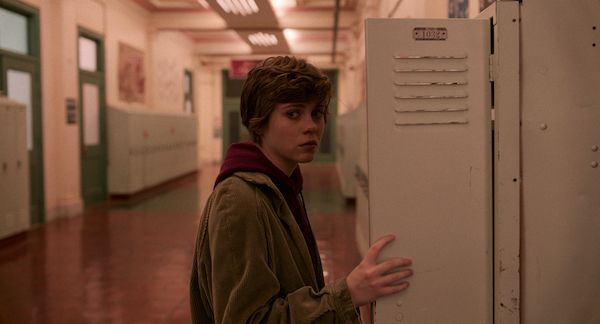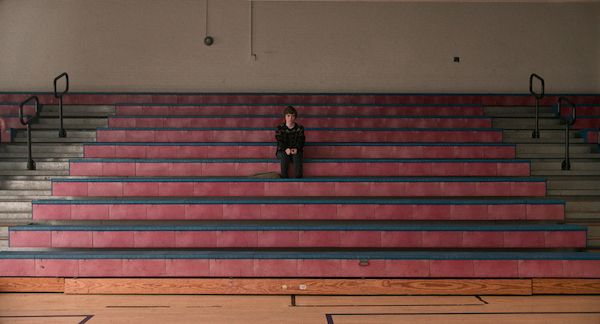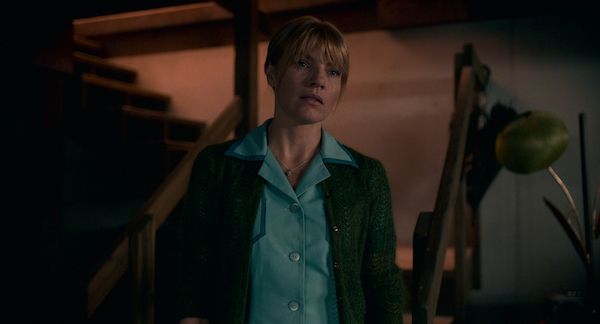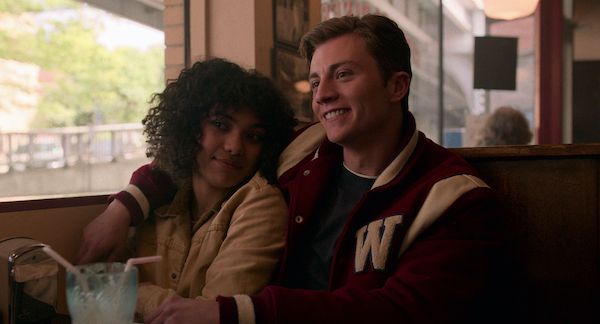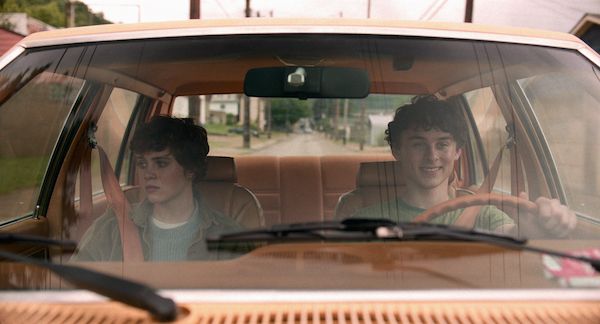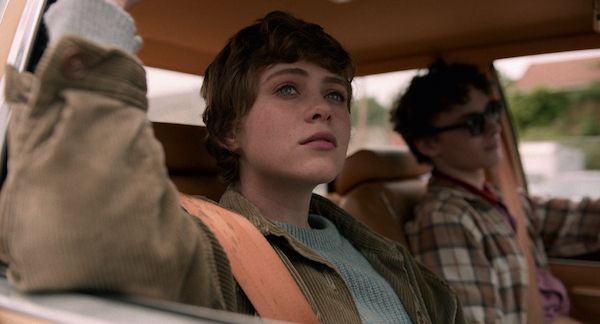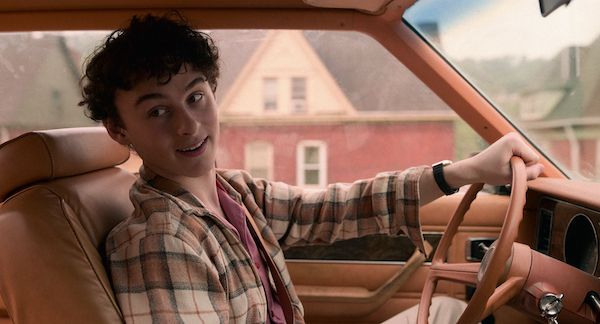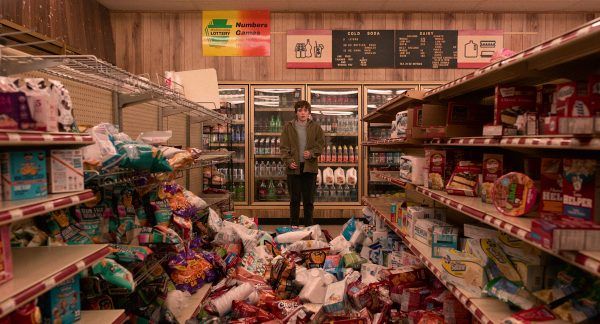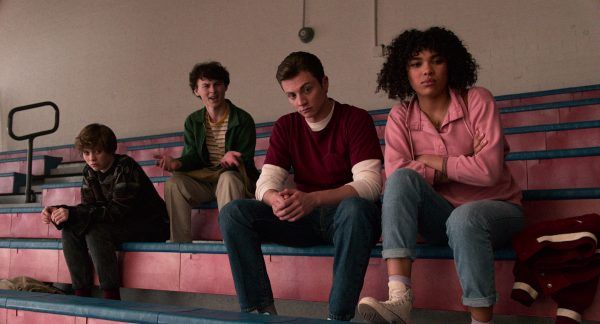Jonathan Entwistle recently entered the TV scene in a big way with the adaptation of Charles Forsman's The End of the F*cking World. Now, he's back for a second helping of teenage angst and drama, with a little dash of superpowers thrown in for good measure, in I Am Not Okay with This. This new series sees Sydney (Sophia Lillis) dealing with some truly difficult personal trauma in her life, complicated by the balancing act between high school drama and romantic entanglements, and an unexplained, burgeoning set of superpowers.
During a visit to the Pittsburgh-based set with a group of fellow journalists, we were able to talk to Entwistle about the angsty teen drama universe he is bringing to Netflix. We chatted about the differences between his two adaptations of Forsman's work and how the source material differs from the live-action series. Entwistle also praised his cast and creative team for delivering something fresh and unique yet familiar and relatable. Plus, Entwistle mentions "Season One" quite a few times, with plenty of comments suggesting what might yet come in Season Two. All that and more follows below:
You know you've had success with the End of the F*cking World and this one is also a Charles Forsman-inspired piece. What is it about his artwork, his voice, his storytelling that really speaks to you and captivates your imagination as a director?
Jonathan Entwistle: I think for a very long time, I was looking for kind of like graphic novel, comic book stuff. Back in England, I judged the British comic book awards. It was always a thing I was connected to and when I first found End of the F*cking World, it was... The first thing I found when I picked up the book was it was just super cinematic. It's literally just big frames that look like stills from movies. He's a huge cinephile and you can just see it immediately in his work. So the first time I ever saw that I was just like... There's so much great imagery in comics, but there's very often not great storytelling and he managed to do something in a white box with someone's head, which had so much story in it that for me it was the first time I'd seen anything that was like that and that kind of really set the ball rolling for what is now a collaboration.
And how involved is he in terms of influencing the tone, the storytelling?
Jonathan Entwistle: A lot of the greatest lines from End of the F*cking World came straight from the book; this book is very different in many ways. There's a lot of the deadpan humor that comes through in this book, in I'm Not Okay with This, definitely all stems from him and his kind of attitude towards... It's kind of like an 80s horror movie obsession that he has, it's definitely woven into this indie movie of a story. And those two things together are very much in Chuck and [my] shared imagination.
Given how dark the graphic novel's story can go with mental illness and all that, how many themes would you say you're going to tackle? Is it going to pull straight from the graphic novel?
Jonathan Entwistle: What I wanted to do was try and find a way to take all the elements of a journey of somebody being confused by lots of different things in their life and try and make a different type of genre show.
It's not necessarily an indie movie version of a superhero show. It's more like a superhero show done differently. And for me, it's like, that's the most important thing. We led with that. Chuck wrote a story about mental illness and essentially suicide. And what we did is we took all of the things that drive the character there and expanded the world and looked at it from a superpower place and built out the backstory of how she got there day one, all of these types of things.
How did you go about with creating the actual superpowers that are on display and making them different from what we've seen a billion times before?
Jonathan Entwistle: I call it, and I called it throughout the writer's room, the Teen Wolf effect, which is where you have superpowers in the most inopportune moments. And that was very much the angle for how we do the superpowers. She kind of has a crush on this guy. She also has a crush on her best friend. She has no idea why she has these crushes. And the really annoying thing is she has superpowers and that to me is how the superpowers work in the show. And they slowly but surely arise throughout; they get bigger and bigger. And those powers coming to the world unlocks a bigger world. Very much, for us, season one is about, "Oh my God. I've got to get to math class but I can't because I just blew down a wall", or this type of thing. The superpower is the hindrance to her getting through high school in season one.
So you do see it as an ongoing series and not a mini series?
Jonathan Entwistle: Absolutely.
Stranger Things and The End of the F*cking World are two huge Netflix shows. What happens when the creative teams from those two collide?
Jonathan Entwistle: Just awesomeness is what happens. I wanted to be able to step into,"How can I take the tone and world of End of the F*cking World and match it with the superpowers and the things which I love when I watch Stranger Things?" Or when I read the comic books and that's what I'm Not Okay with This was in my... like a John Hughes movie with superpowers that that can all be intertwined with a kind of deadpan tone and a world-building aesthetic that we did with End where you can't tell if it's 1978, 2008, 1993. I feel like that is definitely something we've done on this show and the whole aesthetic. And I think it was just making a more irreverent Stranger Things and a slightly more sanitized End of the F*cking World, to meet them in the middle using the superpowers.
And do you worry about if people are like, is she more Eleven or is she more Alyssa? Do you ever think about it?
Jonathan Entwistle: I love that. I think that's amazing. I think I joke with Sophia the whole time about like what do we copy from Stranger Things as a kind of joke because in many ways we reference... it's always going to be a reference because there are similar people in the world and I think that, in a way, there's a lot of fun to be had with that. And, if anything, it makes I'm Not Okay with This stand out as a kind of, almost like a janky indie version of superpowers with lots of other things going on that doesn't necessarily lead with the superpowers but forms like a backdrop. I'd love for it to be like the ugly sister to Stranger Things. That would be my dream.
How would you describe your heroine? Because I think speaking of Eleven and Stranger Things, it's like she is this really powerful but oftentimes very silent lead character.
Jonathan Entwistle: Confused. Yeah. Literally confused with everything. Why her mom won't talk about her, her dad, why her brother wants the mom and her to get along and like all the relationships in the show confuse her the whole time. Like why do I have a crush on her and him at the same time? What? Is that normal? Yes ,in the real world, but no, in shows. So now it's real and normal and thrown away. And I think that we deal with all the high schools stuff and we also deal with superpowers and what will essentially be a bigger mythology behind all of this leading off of Season One.
So 100% confused. She has no idea why she can do all the things and she has no idea why people don't like her at school and et cetera.
Both this and End of the F*cking World take place with these coming-of-age adolescent teenagers. Why do you think that phase of life is so conducive to telling these kinds of stressful stories?
Jonathan Entwistle: Because everything is huge. Literally the tiniest thing. Like, "Oh my God, she unfollowed me on Instagram" is the biggest thing ever in the world. And I think that there's no other place like high school. There's nothing black and white at school. There's nothing... everything is just the biggest deal ever. So you can play with that. Like superpowers becomes the thing she's hiding because the bigger deal is that my best friend's dating a really awful guy.
What is it about these adolescent girls developing superpowers that is resonating with so many people, especially now?
Jonathan Entwistle: I mean I can't really speak for being an adolescent teenage girl, but what I can speak about is universal drama. And I think that for characters that have been kind of not seen on screen before, well not necessarily before, in recent memory. There are movies from back in the 60s and 70s with young female people with superpowers that actually do exist. But I think in recent memory, I think it's just the torch has spun, the flashlight has spun round and it's just come back onto these types of stories again. I think if I just think back maybe 15 years in Marvel Comics, right? There were so many female characters and certainly within the X-Men world who were just cool, that just kind of got brushed aside and now suddenly Dark Phoenix is a big movie.
But how old is that comic book story? What 80s, 70s, something like that? So for me it's just the revolving flashlight of what the appetite is ... and also it kind of doesn't matter. I try and make work that is relatively universal and I feel like with End you didn't need to know... Both Alyssa and James had two sets of agendas and I tried to eradicate a kind of romance and sexuality from that show so that it was about two humans coming together, doing some crazy stuff together and then just living. And I think that for me that is something that is, I'd like to keep in my work because I think it helps people feel more universal.
Congratulations on the Peabody. In some ways, was that a shock?
Jonathan Entwistle: Yeah, kind of. I mean we've had a BAFTA nomination and an Emmy nomination and various things for such a tiny little British show. Winning the Peabody is like really prestigious and it's like, in America, a very prestigious thing and in fact, I got more people commenting on that than our Emmy nomination and the BAFTAs and things like that because I feel like it's kind of cooler. I didn't know much about it to be honest and I was like, Oh, it seems cool that you win something. Yeah. I felt like it was like a Nobel Prize.
Earlier you talked about how a superhero show is done differently; the graphic novel didn't strike me as a superhero sort of typical genre. Are we going to see, as the series or the story goes on, Sydney actually wrestle with the moral imperative of her powers at all. Where do you see it going?
Jonathan Entwistle: We'll see that in Season One. And the ability to kill or hurt people with your powers and then what that means is basically sort of the intrinsic element of most superhero stories. And I think that one of the things I've indulged in is like, "What can you take that must be there?" Usually, in superhero stuff or superpowered stuff, the person gets bitten by a spider or get something and they're like "Holy Fuck, I'm a superhero now. Yes!" Like that. And actually, they're totally okay with it and we just wanted to do something where she's like, "Oh man, I'm not okay with being a superhero." and then she has to learn she's not a superhero, but she has superpowers in this bigger world.
This graphic novel, it could've just been like a limited series. It could have been a one and done. It's got a very strong ending to it, that could've just been it. So how'd you go about breaking that down and expanding the mythology, which you talked about, to give it that seasonal storytelling?
Jonathan Entwistle: Well, I think that I would have adored to have killed the protagonist at the end of it and have a show, but being in the business of episodic television, my job is essentially to do the opposite of that. And one of the things we wrestled with was, how do we not make it dark? The graphic novel works in its way, but personally, End of the F*cking World is dark but it's dumb at the same time. I want to make sure that I keep that. So we did have to extrapolate a lot of that and the superhero... Talking to Chuck, he had these great ideas that never got written into the book about all of these things to do with the father and all of these elements that we kind of work together to try and build something out.
And I want to make sure that Sydney is essentially a Chosen One, the only one right now, and she absolutely hates that and she has to come to terms with what it means to do that. There is, without going into too much detail, a much bigger under-the-surface conspiracy, if you will, that goes back much, much further to do with the powers, that will then come to light for the subsequent seasons where she and her powers, being the most powerful, will be used to somebody else's gain and/or not, depending on where we go.
And what does Sophia bring to the role specifically?
Jonathan Entwistle: She just brings on screen, you will see, she brings a kind of fragility and a reality to somebody who is like actually dealing with the superpowers, so to speak.
She has an amazing acting ability, which comes from nowhere, literally nowhere. You see it when the camera rolls, it is completely out of nowhere and that really helps the character because, in real life, she's constantly surprised and excited by the fact that she's here with us every day. So it's amazing that she can sort of bring that. She has the most amazing face. If I'm honest, she has the most amazing face on camera, which just pops out and she just looks amazing. She has an aesthetic that we've built with, which is very much why we're in Pittsburgh, a kind of rust belt superhero show or a kind of blue-collar aesthetic for superheroes that isn't LA or San Francisco or New York. It's the type of kids who go eat in like diners that have been falling apart.
And in many ways there are places in Pittsburgh that are south, that are down the river, that haven't been touched since everybody left in 1984. So it feels like in many ways we're shooting in that world and she does have that quality to her and something that we've built out. But really she's just a very fragile character that allows us throw superpowers at her and she's like, "Ow! I don't want to do this." And then she's like that in real life. If I actually gave her superpowers in real life, she'd be the same.
How did you guys settle on that aesthetic? The graphic novel itself was kind of simple, pared down. There's not a lot of background, there's not a lot of character design.
Jonathan Entwistle: Two reasons really: Chuck is from Pennsylvania, and the book, he was very excited when the idea of this place came up. And we just visited a few towns and looking around. And we looked at other places. Oregon and these types of places. And as soon as you put a pine forest and suburban house, you've got Stranger Things. So we were very aware of that, too. And so we found a town called Brownsville, which is down the Monongahela and it's just amazing. It's a backlot, like it's untouched. And I just thought, how do you do it differently?
I'm always looking for like the slight difference. I don't need to rewrite the whole wheel of superheroes, but just simply putting someone not walking down a suburban street, putting them in a kind of row houses or by a river with a thousand bridges going down the river, just immediately kind of changes the aesthetic completely. I don't know if I've seen... I've seen blue collar, but I've seen Detroit or I've seen Brooklyn or I've seen Hell's Kitchen. I've seen it done like that way before, but I've never seen rural, semi-suburban steel town superheroes. I don't think. I could be wrong.
What are you most excited for viewers to see with this? Like when you think about it, you're like, "I can't wait for them to get to that."
Jonathan Entwistle: The opening shot. The opening shot and the final shot of the show. I'm just hoping that people see an amazing cast of characters and a taster of what is to come from Season One. It's something that I've worked very hard to pare down in order to go big, moving forwards to build characters out. And also I just want to see how many John Hughes references people can pick out.
End of the F*cking World had such a strong musical DNA. What about this series?
Jonathan Entwistle: Yeah, same. I'm doing it exactly the same. This is the Season Two of End of the F*cking World that everybody wanted to see.
I feel like my approach with music is always the same. One of the beauties of End is that I realized, very early on, the more on the nose we were with the music, the funnier it was, the better it was. The more basic it seemed in your mind the more it worked. And that's something that I want to do with this. Graham Coxon from Blur, who did the soundtrack for End, he's doing this with me as well. So we're very much continuing that same kind of flow on. And I'm kind of enjoying like Midwestern ballads from the 40s and 50s at the moment right now. You know, back when the Midwest was amazing and all of this type of stuff. I quite enjoy that as an aesthetic. But you know, there's John Hughes in there too, so we'll see.
What's one song that you were writing to?
Jonathan Entwistle: I don't know. I'm not going to spoil it
Aside from the graphic novel itself, were there any other inspirations in terms of other comics or even movies or stories that inspired you with this, or your work in general?
Jonathan Entwistle: I think always somewhere between kind of Coen Brothers, David Lynch, and Wes Anderson. If you can find me in there, that's you know, if you lose me, I'm there. Comic book wise, X-Men is my jam, just full stop. I've always been deep into that in all the different ways, whether it be like a kind of Rick Remender Avengers, X-Men world or even just those really early 90s Astonishing X-Men comics. Where they could just speak like teenagers for the first time. And I think that that, along with the concept of Deadpool, and all of those things, certainly in adapting comic books to screen, it feels to me like it's really easy to do it good and nobody ever does it good. The response from the comic book community about how I adapted End was so positive and people were so shocked that we did a good job, and involved Chuck, and were very positive about it. It shocked me that nobody does that more often. Like nobody cares to take the time in that sense. So yeah. Chuck and I have plenty of other projects that are on the horizon, in theory, from his mind, through me, out into the world. So we'll see how that goes.
So it could be an original something that he hasn't written yet, that would just be written for the screen?
Jonathan Entwistle: Could be. In theory, maybe, but also all the other things that he's done, too.

